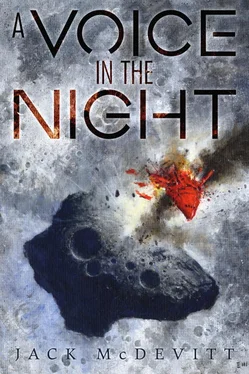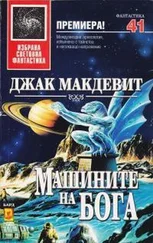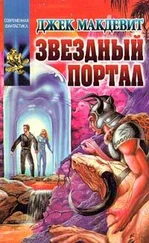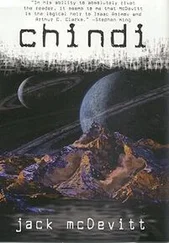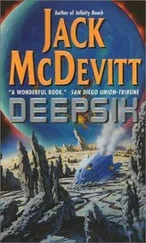“Yes, I’m fine. Why do you ask?”
They all looked up at the tree, glittering against the stars. “Are you serious?” he asked. He looked down at her. The relief had been replaced by a sternness that she rarely saw. “I told you not to do that.”
“It looks great,” said Clem.
Dad frowned at him, but Clem smiled back. “It’s beautiful.”
Two of the others pretended to raise glasses to it.
“Merry Christmas,” said Millie.
Her father assured everyone she would be dealt with properly. But he was too relieved to be angry for long. Nevertheless, he was clearly annoyed that she had disobeyed his wishes. “You’ll be grounded, young lady,” he said.
“I’m sorry, Dad.” The others were all grinning at her. And finally her father joined the crowd. “Just don’t,” he said, “do anything like that again.”
“Okay.”
“Sylvie,” said Jerry, “Why did you do it?”
“I’m not sure,” she said. “I thought the Capellans needed a tree.” She almost giggled.
“I see.” Dad was frowning again. “You could have been killed.”
“I was careful.” Here, at least, her conscience was clear. “I took no chances.”
“Well, I hope you’re satisfied.” He delivered a long, deep sigh. I don’t know what I’m going to do with you.”
Only adults, who generally lack a sense of magic and imagination, are able to sleep easily on this night. Sylvie tossed restlessly, listening to her father moving around downstairs, listening to the wind push against the side of the house. Outside, occasional voices drifted by. Late revellers headed home.
At a few minutes before midnight, she sat up against her pillows so she could see the top of the Aerie. And it occurred to her that Christmas had come at last to Capella III.
THE LOST EQUATION

Emil Kohler was a guy who laughed a lot, chased women, generally enjoyed life, and in his spare time picked up a Ph.D. in physics. But on that gray afternoon, when he walked into a London café, carrying a briefcase, he did not look happy. We hadn’t seen each other since he’d left Baltimore for a teaching position at Brunel University. “Henry,” he said, “it’s good to see you.” We shook hands and he slipped into a chair. “How long has it been?”
“About four years.”
“Well, I see you’ve been moving along. Congratulations.” He dug into the briefcase and produced a copy of my new book, The Philosophy of Friedrich Nietzsche . I was still trying to forget my earlier one, an unhappy analysis of George Bernard Shaw which had sold about fifty copies. I’d said good things about Shaw but apparently even he didn’t like it.
He held it up so a customer seated across from us could admire it. “I wonder if you’d autograph it for me?”
I was trying to look modest. “Of course.” I inscribed it For Emil, a man of exquisite taste , and signed it.
“How did you get involved with German philosophy?” he asked.
“Manufacturing cigars can take you down strange roads.” That had been the family business. “Anyway, it’s good to see you, too, Emil.”
“You still with the Sun ?”
“I’m the Sunday editor.”
“Beautiful. I always knew you would go places.”
“How is life at Brunel?”
“It could hardly be better, Henry. I don’t think I ever realized how much I’d enjoy teaching physics.” He picked up the menu, but he didn’t seem to be paying much attention to it. “You said you’re also going to Germany on this trip?”
“Yes. Next week.”
“Will you be stopping by to say hello to him? To Nietzsche?”
“He died a few years ago.”
“Oh. I’m sorry to hear it.” He hadn’t closed the briefcase yet. And I could see distraction in his eyes. “Why don’t you come over to the house tonight, Henry? For dinner. Eliza will be there.”
I had no idea who Eliza was. “I’d like to,” I said. “But I have a previous commitment. Dr. Watson is giving the graduation address this evening at the London Metropolitan University. I’m going to do a story on it.”
“Dr. Watson? The Dr. Watson?”
“Yes. Are you interested? Would you like to go?”
“Really? Can you arrange that?”
“Sure. No trouble at all. Least I can do for a fellow graduate from Baltimore Polytechnic.”
He laughed. “What time?”
“Six o’clock. You’ll be there?”
“Oh, yes. Certainly. Wouldn’t miss it.”
“Good. I didn’t know you were a Holmes enthusiast.”
“Isn’t everybody on the planet?” He was still holding the briefcase open.
“Now why don’t you tell me what’s on your mind?”
He looked momentarily puzzled. “Nothing. I’m fine. No problems.”
“Let me phrase it differently. What else is in the briefcase?”
He flashed a tentative smile. “Mr. Holmes has nothing on you, has he?” He lifted out a pair of notebooks. “You remember when I left home I told you I was coming here to spend some time with relatives?”
Emil had never known his mother, and his father had died while he was at the Polytech. “I remember you said something about a cousin. His name was Earl, right?”
“It was Steve.” His lips tightened. “Steve Addington. He died while I was on the way over.”
“I’m sorry,” I said. “What happened?”
A waiter showed up. We both ordered fish and chips. When we were alone again, Emil continued: “A stroke. He was only thirty-two. Nobody saw it coming. He was a professor at City University. He was on his way home one night but when the coach arrived they found him collapsed inside. Died at the hospital a few hours later.”
“Pity. He was a physicist, too, wasn’t he?”
“Yes. He was the one who got me interested in the field. That was before my family moved to the States.” Emil had blond hair and amiable blue eyes. But they’d become intense.
“So what’s going on?”
He set his elbows on the table, folded his hands, and braced his chin on them. “You know who Einstein is?”
“The Swiss patent clerk who published something about relativity?”
“Yes. Are you familiar with the equation he’s come up with?”
“Not really. I probably shouldn’t admit this, Emil, but I’ve never had much interest in physics.”
“As far as I can tell, Steve was there first, with the relativity research.” He opened one of the notebooks to a page that had been folded over so he could find it easily, and passed it to me. “These are Steve’s.” The page was covered with numbers, symbols, and obtuse terms that meant nothing to me. The only thing I recognized was Newton’s name followed by a couple of exclamation marks. He pointed at a line near the bottom. E=c²m . “You recognize it?”
“Not really.”
“It’s the Einstein equation. Steve had the light and mass symbols in reverse order, but it doesn’t matter.”
“So what’s the point, Emil?”
“This is central to Einstein’s work. Particles can be made to produce substantial amounts of energy. This is the heart of it, Henry.”
“So you’re telling me that your cousin was interested in the same thing Einstein was doing. Why does that matter?”
“Henry, he was ahead of Einstein. This stuff is all dated 1902 and 1903. But he never told anybody.” He took a deep breath. “Steve had the formula two years before Einstein did.” It was beginning to rain. A coach rattled past. I didn’t see it, but it made a lot of noise and reminded me there was a real world out there. “Henry, we’re talking about the biggest scientific breakthrough since Darwin.”
Читать дальше
